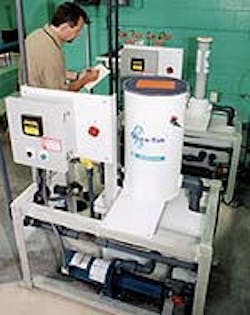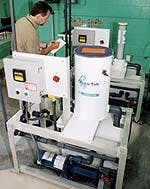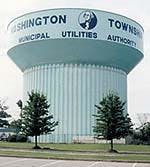Calcium Hypochlorite System Improves Water Quality
By Joanne Funyak
The Washington Township Municipal Authority (WTMUA) recently switched to a new disinfection system that uses calcium hypochlorite tablets. The system has reduced consumer complaints and lowered operating costs.
WTMUA is located in the quiet community of Turnersville in southern New Jersey. The authority operates a public water system of 13 active wells producing an annual average flow of 5 mgd, with a maximum peak summer flow of 9-10 mgd, serving in excess of 14,000 connections. As the sprawl of suburban Philadelphia grew, so did this community and the concern for safety, liability, and regulatory compliance. All of the wells, which were once in remote locations, are now surrounded by development.
In 1995 the State of New Jersey, foreseeing concerns with the use of gas chlorine, particularly in residential neighborhoods, implemented the Toxic Catastrophe Prevention Act (TCPA). The TCPA is a forerunner of the federally mandated EPA Risk Management Plan. New Jersey's TCPA mandated water purveyors to limit storage of gas at any one site to less than 500 pounds or face the rigors of TCPA regulation.
WTMUA estimated the initial startup cost to be $45,000 to $50,000 for engineering fees, emergency evacuation studies, training, etc. This, coupled with the prospect of ongoing studies and fees, forced Paul DeCosta, Superintendent of the WTMUA, to seek alternatives to gas chlorination.
Shortly after the enactment of TCPA, WTMUA converted its wells to sodium hypochlorite, also known as liquid bleach. However, the authority was not completely happy with the new system.
While attending the New Jersey AWWA Conference in April 1999, DeCosta was introduced to a calcium hypochlorite tablet chlorination system. The system used a three inch calcium hypochlorite tablet to produce low concentration (<0.02 percent) chlorine solutions. The solution provided the same disinfection (hypochlorous acid), as do other means of chlorination yet without the side effects.
It was the system's simplicity and ease of use that first caught DeCosta's eye. The thought of no air bound pumps, no storage tanks, no corrosion of electronic equipment and no exposure to hazardous chemicals that convinced him to give it a try.
In the spring of 2000, WTMUA started the conversion of its wells from liquid bleach to the Accu-Tab System by PPG Industries. The system consists of an erosion chlorinator, solenoid valve, flow meter, centrifugal pump, and PVC piping.
Within one month the system pH was reduced to 7.5, chlorine residuals were maintained at the 0.03 mg/l level they desired, taste and odor complaints were reduced by 90 percent and worker morale was up. Maintenance was reduced from one man-day per week to less than four man-hours per month. Workers are no longer subjected to working on pressurized lines containing a hazardous solution, thus improving operator safety. Also, neighbors surrounding the well stations are no longer subjected to the storage of large quantities of hazardous chemicals, trucks making bulk deliveries and noxious fumes associated with off gassing.
More importantly, the residents of Turnersville are happy with their water quality. DeCosta said one resident who has been a chronic complainer stopped by one week after the start of the new system and asked, "What are you doing differently? This is just like the water was years ago." Board members have also commented on the change.
As the community continues to grow, DeCosta has made plans to install the calcium hypochlorite system in three future well stations.
WTMUA is currently using the Accu-Tab PowerPro Chlorination System by PPG Industries. The system combines patented chlorinators with slow release 65 percent calcium hypochlorite to provide a complete system for tablet chlorination. The chlorinators are not designed to hold pressure, which would cause them to fill with water and erode all the tablets at once. Instead, incoming water from a side stream contacts only the tablets at the bottom of the feeder, so tablets at the top stay dryno premature dissolving.
Accu-Tab tablets erode at a predictable rate according to the amount of water that enters the chlorinator. By controlling the water flow rate, highly accurate chlorine dosage can be achieved. Chlorinator effluent is returned to the unchlorinated main system flow, providing the desired level of available chlorine to meet operational requirements.
About the Author: Joanne Funyak is the Accu-Tab System Marketing Manager for PPG Industries, Inc., Pittsburgh, PA. She can be reached at [email protected] WW/


